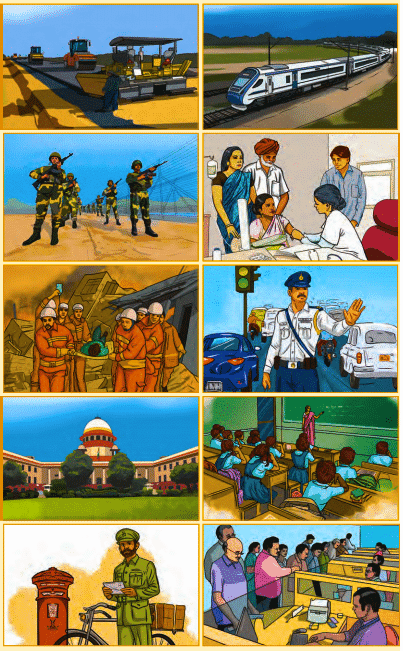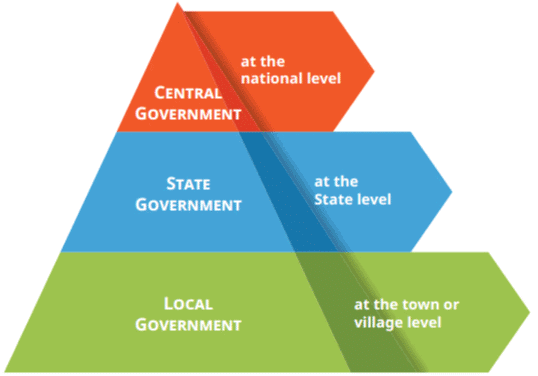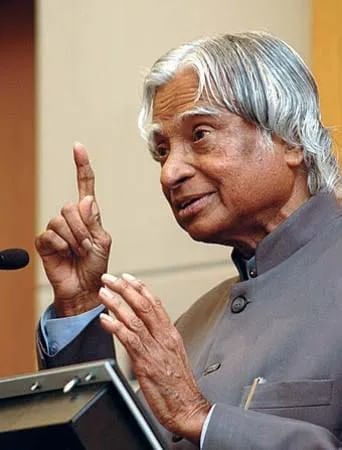Short & Long Question Answers: Grassroots Democracy - Part 1 Governance | Short & Long Answer Questions for Class 6 PDF Download
Short Question Answers
Q1: Why does society need rules?
Ans: Rules maintain order and harmony in society. Without them—whether at home, school, or roads—chaos erupts from disagreements. Traffic rules prevent accidents, school rules aid learning, and job rules ensure equity. Society collapses without these guidelines, acting as glue to keep communities functioning smoothly and safely.

Q2: What is governance?
Ans: Governance involves deciding, organising society with rules, and ensuring compliance. Government, a group or system, manages this, crafting laws from rules. It balances needs, order, and keeps society on track for everyone’s benefit.
Q3: What role does government play in daily life?
Ans: Government oversees services like digital money transfers, replacing slow post-office queues. It combats cybercrime with laws, uses police for safety, and courts for justice. From flood relief to electricity, it shapes daily life—ensuring security, education, support—acting as a guiding force.
Q4: What task does the legislature perform in government?
Ans: The legislature creates and updates laws. Comprising people’s representatives, it adapts rules—like cybercrime laws—to current needs. Think of it as a team revising game instructions, ensuring society stays fair, responsive to changes over time.
Q5: How does the executive operate within governance?
Ans: The executive enforces laws, led by the President, Prime Minister, ministers, and agencies like the cyber police, it enforces laws. For cybercrime it catches thieves. Like a coach executing plays, it ensures the legislature’s rules work, maintaining society’s order.
Q6: What purpose does the judiciary serve in government?
Ans: The judiciary, a court system, judges lawbreakers, and sets punishment. For cyber criminals, it imposes fines, jail. It reviews executive actions, laws for fairness—like a referee ensuring just play—safeguarding rights across society.
Q7: What does ‘separation of powers’ mean? Why is it vital?
Ans: ‘Separation of powers’ divides government into legislature, executive, and judiciary, each distinct yet cooperative. It’s vital for checks, balances—each watches the others, correcting oversteps, like friends maintaining honesty.
Q8: How do India’s three government levels function?
Ans: India’s government operates locally, statewide, and nationally. Local tackles small issues—like town floods—state manages larger ones with rescue, national government aids huge crises with the army. Like fixing a light—start small, escalate—they divide tasks, ensuring smooth handling everywhere.

Q9: What mottos guide India’s government and, Supreme Court?
Ans: India’s government motto, "Satyameva Jayate" (Truth alone triumphs), Supreme Court’s "Yato Dharmastato Jayah" (Where dharma exists, victory follows), come from ancient texts, the document notes. They inspire truth, justice in ruling, guiding governance with timeless values.
Q10: How did Dr. A.P.J. Abdul Kalam inspire as President?
Ans: Dr. A.P.J. Abdul Kalam, President 2002–2007, inspired youth with education, ambitions. A scientist from humble origins, he urged innovation, effort—saying “dreams keep you awake.” Beyond his nominal role, he touched millions, proving leadership shapes lives.

Q11: What is ‘democracy,’ how does it begin?
Ans: ‘Democracy’ means ‘people’s rule,’ from Greek dēmos, kratos. It begins with electing representatives—like class monitors—since everyone can’t govern. In India, MPs, MLAs debate laws, making it practical, powerful for voicing people’s needs.
Q12: How does direct democracy differ from representative democracy?
Ans: Direct democracy involves everyone voting—like a class choosing a picnic spot by hand-raising. Representative democracy elects leaders—MPs, MLAs—to decide, fitting India’s 970 million voters in 2024. It balances scale, participation differently.
Q13: What do you mean by ‘grassroots democracy’?
Ans: ‘Grassroots democracy’ empowers ordinary citizens—the pyramid’s base—to influence decisions affecting them. Like proposing school changes, it grows from the ground. India’s elections, local rule encourages this, ensuring small voices help shape laws, life.
Long Question Answers
Q1: Why does society require government? How do rules sustain order?
Ans:
- Society needs government because large groups living together face disputes, disorder without rules.
- Homes have bedtime rules, schools ban cheating, roads demand traffic signals—without them, chaos reigns.
- Imagine drivers crashing, classrooms failing, jobs crumbling—society stops working.
- The government crafts, enforces rules, some of which become laws, to preserve harmony.
- It’s akin to a referee setting fair play.
- For example, exams need guidelines, jobs require employer rules, and citizens depend on laws.
- Governance decides, organises, and ensures compliance, keeping life balanced.
- The Mahābhārata’s view—rulers guard dharma, dharma guards back—shows this: government upholds order, order upholds us.
- Lacking it, society falters in a rule-free mess, proving the government’s essential role.
Q2: What roles do the three government organs play, and how do they collaborate in the cybercrime case?
Ans:
- The three organs—legislature, executive, judiciary—each have distinct tasks.
- Legislature, people’s representatives, make laws—like cybercrime rules as digital theft surged.
- Executive, led by heads, agencies like the cyber police, enforce them, catching online criminals.
- Judiciary, through courts, judges guilty, impose fines, jail for cybercriminals, ensuring justice.
- In this case, collaboration shines: the legislature sets the law, the executive nabs thieves, the judiciary punishes, and verifies fairness.
- It stresses their separation—each handles its part, like a relay team—yet they unite against modern crime.
- This ‘checks, balances’ setup prevents overreach, maintaining steady governance.
- Together, they shield society from digital threats, showing how organs interlock for safety, equity.
Q3: How do India’s three government levels operate, and why do they matter?
Ans:
- India’s government functions at the local, state, and national levels.
- Local addresses minor issues—like a town flood—quickly, nearby.
- State takes on broader problems, deploying rescue for district floods, while the national government manages vast crises, sending the army for massive floods.
- It’s like troubleshooting a light—check small, call help, escalate.
- Each level splits duties—local for streets, state for health, national for defence—easing the burden.
- Floods show it—local begins, state expands, national rescues.
- This division suits India’s size, ensures aid reaches all, from villages to cities, strengthening governance with a layered response.
Q4: What defines democracy, and how does India apply it as a representative system?
Ans:
- Democracy means ‘people’s rule,’ from the Greek dēmos (people), kratos (power).
- Since all can’t govern, India elects representatives—MLAs for states, MPs for the nation—like class monitors speaking up.
- Boasting 970 million voters in 2024, it’s the world’s largest democracy, open to those over 18.
- These leaders debate in assemblies—Lok Sabha, Rajya Sabha, Vidhan Sabha—crafting laws, solving issues, akin to choosing a picnic spot on a grand scale.
- Unlike direct voting, where all decide, this fits India’s vastness.
- It notes its practicality: one represents many, balancing views via elections.
- Grassroots kick off here—people pick leaders—making India’s democracy a living, giant system driven by votes.
Q5: How did Dr. A.P.J. Abdul Kalam influence governance ideas in his nominal role?
Ans:
- Dr. A.P.J. Abdul Kalam, President 2002–2007, shaped governance beyond his nominal role.
- From humble Rameswaram roots, he rose as ‘Missile Man,’ and then led with heart.
- He inspired youth with education and ambition—urging “dreams keep you awake,” pushing learning, effort, and perseverance.
- Though not the executive head, he connected to people, not power, boosting innovation, positivity.
- His sayings—like “F.A.I.L. is First Attempt in Learning”—ignited millions, proving leadership transcends titles.
- People praise his humility, social zeal, showing that even symbolic roles can steer democracy toward growth.
- Kalam’s journey reflects grassroots spirit—rising from below, lifting everyone—making him a governance beacon through vision, not just rule.
FAQs on Short & Long Question Answers: Grassroots Democracy - Part 1 Governance - Short & Long Answer Questions for Class 6
| 1. What is grassroots democracy? |  |
| 2. Why is grassroots democracy important? |  |
| 3. How can citizens participate in grassroots democracy? |  |
| 4. What role do local governments play in grassroots democracy? |  |
| 5. What challenges does grassroots democracy face? |  |

















